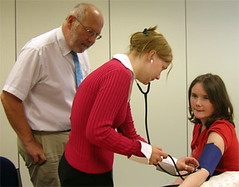 (CNN) -- "Two minutes!" yells our course coordinator.
(CNN) -- "Two minutes!" yells our course coordinator.
Medical student Emily Breidbart joins her anatomy lab partner, Jonathan Adelstein, on the last day of class.
Her voice startles me as I try to concentrate on Mrs. Chin's account of her recent asthma attacks.
I have already used eight of 10 allotted minutes, and now have to wrap up my "Objective Structured Clinical Examination."
During our four years as medical students, we will do dozens of these OSCEs -- imaginary, but realistic doctor-patient scenarios.
My professor praises that I structured my 10 minutes well. I'm pleased. In our first year, we simply take a medical history. But next year, I'll add a physical examination, and in my third year, I'll be adding counseling and treatment into the "patient visit." And all we get is five more minutes added onto our OSCE time. How can I get all of this done in just 15 minutes?
Learning how to practice medicine on this sort of a time-scale is stressful. But it's totally necessary in order to properly train us for a world of health care in which the average physician visit is six minutes! When our professors went to medical school, they were taught the art of healing; we are taught how to diagnose and treat patients in a limited timeframe. I can't help but think, is this what I signed up for?
My father is a pulmonologist and the head of an eight-doctor practice on Long Island. When I tell people this, many say, "Oh, he must have really wanted you to follow in his footsteps!" But actually, he made me very wary of medicine. He is tired of spending half of his energy dealing with insurance companies. Energy and time, he says, that would be better spent on his patients, time he had when he first started practicing in a health-care era in which doctors didn't need to justify prescriptions and tests to insurance companies. He still insists on giving ample time to his patients, but now has to work incredibly long hours to do so.
At my dad's 50th birthday party, when I was 19, his colleagues interrogated me about my recent decision to pursue medicine.
Are you sure you really want to do this?
Why put yourself through all the years of stress? You're a smart girl -- how about journalism, law, business...?
Your dad couldn't convince you not to do this? I'll have to have a talk with him!
How is it that my classmates and I are going into medicine if this is what people who have lived our future are saying?
We start out in medical school as idealists. We thirst for clinical experience. We want to explore all of our options, and help those who can't afford health care. But somewhere along the line, we start taking off our rose-colored glasses. I've seen it happen already with some classmates after only one year of school. We know that it is surgeries and procedures that are financially rewarded. Insurance companies reimburse very little for routine examinations. So although we might really be interested in primary care or pediatrics, after hundreds of thousands of dollars of debt (my school estimates that each year, tuition, housing and expenses will cost about $55,000), many of us feel pressured to go into a specialty field that will ensure we can pay back our loans. Our dreams and good intentions have to be put aside.
And then there are fields like OB-GYN, which a lot of my colleagues have already ruled out because of the high cost of malpractice insurance.
We are taught about malpractice from Day 1. I remember countless times in the anatomy lab when we were digging for arteries and nerves, our teachers saying, "Now if you cut this in real life, you would be sued," phrased in terms of a legal consequence instead of the repercussion that the patient might die.
This "art of defensive medicine" infiltrates the classroom too. We are taught how to ask questions of our patients and treat them in such a way that minimizes our risk of a lawsuit. We are trained what kind of patients to be wary of. Basically, we are taught that we can't trust our future patients, which is confusing to first-year medical students. How can we expect our patients to trust us if we can't trust them?
Yet, after all this, I'm truly excited to be a doctor. Medical science and technology are booming and there will be so many ways in which we can help our patients. I want to go into pediatrics, and can see nothing more rewarding then helping sick children. And I can't blame the medical school curriculum; it is only preparing us for a reality. It is my hope however, that in my lifetime, our health-care system will change in such a way that lets us go back to simply learning the art of healing.
From:
CNN.com
(CNN) -- "Two minutes!" yells our course coordinator.







0 comments:
Post a Comment